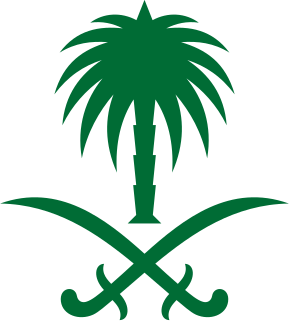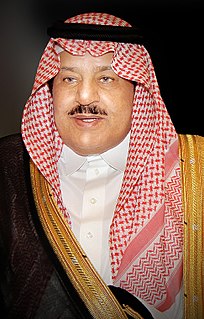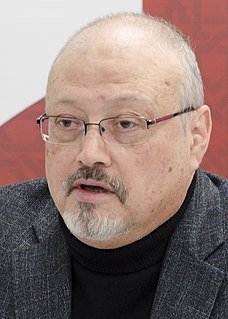| |||||
| Decades: | |||||
|---|---|---|---|---|---|
| See also: | Other events of 2012 History of Saudi Arabia | ||||
The following lists events that happened during 2012 in the Kingdom of Saudi Arabia .
| |||||
| Decades: | |||||
|---|---|---|---|---|---|
| See also: | Other events of 2012 History of Saudi Arabia | ||||
The following lists events that happened during 2012 in the Kingdom of Saudi Arabia .

The economy of Saudi Arabia is one of the top twenty economies in the world, and the largest economy in the Arab world as well as in the Middle East. Is permanent member Leader of OPEC Countries; And is permanent member part of the G20 group of countries.

Saudi Arabian stated policy is focused on co-operation with the oil-exporting Gulf States, the unity of the Arab world, Islamic strength and solidarity, and support for the United Nations (UN). In practice, the main concerns in recent years have been relations with the US, the Israeli–Palestinian conflict, Iraq, the perceived threat from the Islamic Republic of Iran, the effect of oil pricing, and using its oil wealth to increase the influence of Islam. Saudi Arabia contributes large amounts of development aid to Muslim countries. From 1986 to 2006, the country donated £49 billion in aid.

Saudi Aramco, officially the Saudi Arabian Oil Company, is a Saudi Arabian public petroleum and natural gas company based in Dhahran. As of 2020, it is one of the largest companies in the world by revenue. Saudi Aramco has both the world's second-largest proven crude oil reserves, at more than 270 billion barrels, and largest daily oil production of all oil-producing companies. It is the single greatest contributor to global carbon emissions of any company in the world since 1965.

Saudi Arabia, officially the Kingdom of Saudi Arabia (KSA), is a country on the Arabian Peninsula in Western Asia. It has a land area of about 2,150,000 km2 (830,000 sq mi), making it the fifth-largest country entirely in Asia, the second-largest in the Arab world, and the largest in Western Asia. It is bordered by the Red Sea to the west, Jordan, Iraq, and Kuwait to the north, the Persian Gulf, Qatar, and the United Arab Emirates to the east, Oman to the southeast, and Yemen to the south. Bahrain is an island country off the east coast. The Gulf of Aqaba in the northwest, whose maximum width is 24 km (15 mi), separates Saudi Arabia from Egypt. Saudi Arabia is the only country with a coastline along both the Red Sea and the Persian Gulf, and most of its terrain consists of arid desert, lowland, steppe, and mountains. Its capital and largest city is Riyadh. The country is home to Mecca and Medina, the two holiest cities in Islam.

Human rights in Saudi Arabia are a topic of concern. The Saudi government, which mandates Muslim and non-Muslim observance of Sharia law under the absolute rule of the House of Saud, have been accused of and denounced by various international organizations and governments for violating human rights within the country. The totalitarian regime ruling the Kingdom of Saudi Arabia is consistently ranked among the "worst of the worst" in Freedom House's annual survey of political and civil rights. On 28 December 2020, the Criminal Court in Riyadh sentenced a prominent Saudi women's rights activist to nearly 2 years in prison, drawing a renewed attention to the kingdom's human rights issues. Qorvis MSLGroup, a U.S. subsidiary of Publicis Groupe, has been working with Saudi Arabia amidst its executions of political protesters and opponents for more than a decade to whitewash its record of human rights abuses.

Nayef bin Abdulaziz Al Saud was the crown prince of Saudi Arabia and deputy prime minister from October 2011 and the minister of interior from October 1975 until his death in June 2012.

Salman bin Abdulaziz Al Saud is King of Saudi Arabia, reigning since 23 January 2015. Prior to his accession, he was Crown Prince of Saudi Arabia from 16 June 2012 to 23 January 2015. He is the 25th son of King Abdulaziz and the sixth of his sons who have reigned as kings.

Al-Wehda FC is a multi-sports club from Mecca, Saudi Arabia, founded in 1945, making it the third oldest club in Saudi Arabia. The football section plays in the Saudi Professional League. They also have a handball section.
Mohammed Hussein Ali Al-'Amoudi is an Ethiopian-Saudi billionaire businessman. He was born in Ethiopia in 1946 to a Hadhrami father and an Ethiopian mother. In 2016, his net worth was estimated by Forbes at approximately $10.9 billion and a relative fall in net value was linked to the global fall in oil and gold prices at the time of estimation. He was also listed as Ethiopia's richest man, the second richest Saudi Arabian citizen in the world and the second richest person of African descent in the world. Al Amoudi made his fortune in construction and real estate before branching out to buy oil refineries in Sweden and Morocco. He is the largest individual foreign investor in Ethiopia and a major investor in Sweden.

Jamal Ahmad Khashoggi was a Saudi Arabian journalist, dissident, author, columnist for The Washington Post, and a general manager and editor-in-chief of Al-Arab News Channel who was assassinated at the Saudi consulate in Istanbul on 2 October 2018 by agents of the Saudi government, allegedly at the behest of Crown Prince Mohammed bin Salman. He also served as editor for the Saudi Arabian newspaper Al Watan, turning it into a platform for Saudi progressives. Khashoggi fled Saudi Arabia in September 2017 and went into self-imposed exile. He said that the Saudi government had "banned him from Twitter", and he later wrote newspaper articles critical of the Saudi government. Khashoggi had been sharply critical of the Saudi rulers, King Salman and Crown Prince Mohammed bin Salman. He also opposed the Saudi Arabian-led intervention in Yemen.

Saudi Arabia is not known to have a nuclear weapons program. From an official and public standpoint, Saudi Arabia has been an opponent of nuclear weapons in the Middle East, having signed the Treaty on the Non-Proliferation of Nuclear Weapons, and is a member of the coalition of countries demanding a Nuclear-weapon-free zone in the Middle East. Studies of nuclear proliferation have not identified Saudi Arabia as a country of concern. Nuclear technology company IP3 International was formed in June 2016 to transfer nuclear technology from the United States to Saudi Arabia.
Capital punishment is a legal penalty in Saudi Arabia. The country executed at least 158 people in 2015, at least 154 in 2016, at least 146 in 2017, 149 in 2018, 184 in 2019, and 27 in 2020. The drastic reduction in 2020 was due to a moratorium on death penalties for drug-related offenses.

Abdullah bin Abdulaziz Al Saud was a Saudi Arabian politician and military commander who ruled as King of Saudi Arabia from 1 August 2005 until his death in 2015. Prior to his ascension, he was Crown Prince of Saudi Arabia since 13 June 1982. He was the tenth son of King Abdulaziz, the founder of Saudi Arabia, and the fifth of Abdulaziz's six sons who were kings.
Islam is the state religion of Saudi Arabia. No law requires residents to be Muslim, however, public worship by adherents of religions other than Islam is forbidden. Any non-Muslim attempting to acquire Saudi Arabian nationality must convert to Islam. Furthermore, Hanbali is the official version of Sunni Islam and adherence to other sects is restricted. Saudi Arabia has been criticized for its implementation of Islamic law and its human rights record. According to a 2012 online poll by WIN-Gallup International, 5% of 502 Saudi Arabians surveyed stated they were "convinced atheists".

The protests in Saudi Arabia were part of the Arab Spring that started with the 2011 Tunisian revolution. Protests started with a self-immolation in Samtah and Jeddah street protests in late January 2011. Protests against anti-Shia discrimination followed in February and early March in Qatif, Hofuf, al-Awamiyah, and Riyadh. A Facebook organiser of a planned 11 March "Day of Rage", Faisal Ahmed Abdul-Ahad, was allegedly killed by Saudi security forces on 2 March, with several hundred people protesting in Qatif, Hofuf and al-Amawiyah on the day itself. Khaled al-Johani demonstrated alone in Riyadh, was interviewed by BBC Arabic Television, was detained in ʽUlaysha Prison, and became known online as "the only brave man in Saudi Arabia". Many protests over human rights took place in April 2011 in front of government ministry buildings in Riyadh, Ta'if and Tabuk and in January 2012 in Riyadh. In 2011, Nimr al-Nimr encouraged his supporters in nonviolent resistance.

Until June 2018, Saudi Arabia was the only country in the world in which women were forbidden from driving motor vehicles. The Women to Drive Movement was a campaign by Saudi women, whom the government denies many rights to which men are entitled, for the right to drive motor vehicles on public roads. Dozens of women drove in Riyadh in 1990 and were arrested and had their passports confiscated. In 2007, Wajeha al-Huwaider and other women petitioned King Abdullah for the right to drive, and a film of al-Huwaider driving on International Women's Day 2008 attracted international media attention.

Samar bint Muhammad Badawi is a Saudi Arabian human rights activist. She and her father filed court cases against each other. Badawi's father accused her of disobedience under the Saudi Arabian male guardianship system and she charged her father with adhl—"making it hard or impossible for a person, especially a woman, to have what she wants, or what's rightfully hers; e.g, her right to marry" according to Islamic jurisprudence—for refusing to allow her to marry. After Badawi missed several trial dates relating to the charge, an arrest warrant was issued for her, and Badawi was imprisoned on 4 April 2010. In July 2010, Jeddah General Court ruled in Samar Badawi's favor, and she was released on 25 October 2010, and her guardianship was transferred to an uncle. There had been a local and international support campaign for her release. The Saudi NGO Human Rights First Society described Badawi's imprisonment as "outrageous illegal detention".

Raif bin Muhammad Badawi is a Saudi writer, dissident and activist, as well as the creator of the website Free Saudi Liberals.

The Iran–Saudi Arabia proxy conflict, sometimes also referred to as the Middle Eastern Cold War, is the ongoing struggle for influence in the Middle East and other Muslim regions between Iran and Saudi Arabia. The two countries have provided varying degrees of support to opposing sides in nearby conflicts, including the civil wars in Syria and Yemen; and disputes in Bahrain, Lebanon, and Qatar. It also extends to disputes or broader competition in other regions such as Nigeria, Pakistan, Afghanistan and other parts of North and East Africa, South Asia, Central Asia, Southeast Asia, the Balkans, and the Caucasus.

Saudi Arabian–Swedish relations are the bilateral relations between the Kingdom of Saudi Arabia and the Kingdom of Sweden.